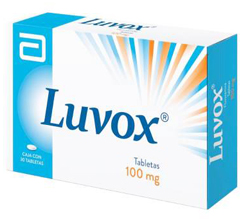Luvox (Fluvoxamine)
Luvox belongs to the class of medications called selective serotonin reuptake inhibitors. It is used to treat depression and obsessive-compulsive disorder. It helps to reduce anxiety and unpleasant thoughts associated with OCD and improves mood by treating depression.
Serotonin reuptake inhibitors are thought to work by increasing the amount of a neurotransmitter (a chemical found in the brain) called serotonin. Although you may start feeling better within a few weeks of treatment, the full effects of the medication may not be evident until several weeks of treatment have passed.
This medication may be available under multiple brand names and/or in several different forms. Any specific brand name of this medication may not be approved or available in all of the forms.
Used for:
- Obsessive-compulsive disorder
- Depression
- Eating disorder
- Panic disorder
- Social phobia
Physicians and the millions of Americans with OCD have, with Luvox, a new option in drug treatment. Patients who have not benefitted previously from medication may respond to Luvox.
Studies show that Luvox is effective for elderly patients as well as young persons. The safety and effectiveness of Luvox have not been established for those under 18 years of age. Luvox should be used cautiously in patients with a history of mania and seizures. Nursing mothers and women who become pregnant during therapy with Luvox should consult a physician about continuing treatment.
A recent nationwide survey of adults found that over half of the respondents were not aware that medications exist to treat OCD. Luvox represents another pharmacotherapy option in therapy that may help to clear up this misperception and increase the number of people being successfully treated for OCD.

How long does it take for Fluvoxamine to work? Sleep, energy, or appetite may show some improvement within the first 1-2 weeks. Improvement in these physical symptoms can be an important early signal that the medication is working. Depressed mood and lack of interest in activities may need up to 6-8 weeks to fully improve.
Reasons to buy Luvox:
- Luvox CR (fluvoxamine) is a first choice for treating obsessive-compulsive disorder.
- Both the immediate release and extended release versions of Luvox CR (fluvoxamine) are available as generic.
- Unlike other similar medicines, Luvox CR (fluvoxamine) doesn't cause weight gain
Warnings and Precautions
Many medications can cause side effects. A side effect is an unwanted response to a medication when it is taken in normal doses. Side effects can be mild or severe, temporary or permanent.
The side effects listed below are not experienced by everyone who takes this medication. If you are concerned about side effects, discuss the risks and benefits of this medication with your doctor.
The following side effects have been reported by at least 1% of people taking this medication. Many of these side effects can be managed, and some may go away on their own over time.
Contact your doctor if you experience these side effects and they are severe or bothersome. Your pharmacist may be able to advise you on managing side effects.
- constipation
- decreased appetite
- diarrhea
- dizziness
- drowsiness
- dry mouth
- feeling of constant movement of self or surroundings
- headache
- increased sweating
- nausea
- trembling or shaking
- trouble sleeping
- vomiting
Contraindications
Bleeding: Fluvoxamine, like other SSRI medications, may cause an increased risk of bleeding, particularly if you are taking acetylsalicylic acid (ASA) or other medications that affect how the blood clots. If you notice any signs of bleeding, such as frequent nosebleeds, unexplained bruising, or black and tarry stools, notify your doctor as soon as possible. Your doctor will order routine blood tests to make sure potential problems are caught early.
Bones: Flovoxamine, like other SSRI medications, may increase the risk of bone fracture, especially if you are a senior or have osteoporosis or other major risk factors for breaking a bone. Take extra care to avoid falls, especially if you get dizzy or have low blood pressure. Your doctor may monitor your bones while you are taking this medication.
Change in blood sugar levels: Changes in blood sugar levels have been reported in the early stages of treatment in people taking fluvoxamine, whether or not they have been diagnosed with diabetes. People with diabetes may find it necessary to monitor their blood sugar more frequently while using this medication.
If you have diabetes or are at risk for developing diabetes, discuss with your doctor how this medication may affect your medical condition, how your medical condition may affect the dosing and effectiveness of this medication, and whether any special monitoring is needed.
Drowsiness/reduced alertness: Some people who take fluvoxamine may become drowsy. Avoid activities that require complete mental alertness, judgment, and physical coordination (such as driving a car or performing hazardous tasks) until you determine how fluvoxamine affects you.
Glaucoma: This medication may cause the symptoms of glaucoma (increased pressure in the eye) to become worse. If you have glaucoma, discuss with your doctor how this medication may affect your medical condition, how your medical condition may affect the dosing and effectiveness of this medication, and whether any special monitoring is needed. Report any changes in vision to your doctor as soon as possible while you are taking this medication.
Seizures: There have been occasional reports of seizures occurring with fluvoxamine. If you have a history of epilepsy or medical conditions that increase the risk of seizures, discuss with your doctor how this medication may affect your medical condition, how your medical condition may affect the dosing and effectiveness of this medication, and whether any special monitoring is needed.
Serotonin Syndrome: Severe reactions are possible when fluvoxamine is combined with other medications that act on serotonin, such as tricyclic antidepressants and certain medications used to treat migraines. These combinations must be avoided. Symptoms of a reaction may include muscle rigidity and spasms, difficulty moving, changes in mental state including delirium and agitation. Coma and death are possible.
If you are taking antidepressants, discuss with your doctor how this medication may affect your medical condition, how your medical condition may affect the dosing and effectiveness of this medication, and whether any special monitoring is needed.
Stopping the medication: Stopping this medication suddenly may lead to side effects such as dizziness; abnormal dreams; confusion; burning, prickling, or tingling skin; difficulty concentrating; fatigue; anxiety or agitation; shaking; nausea or vomiting; or sweating. If you are thinking of stopping the medication, check with your doctor first.
Suicidal or agitated behaviour: Adults and children taking this medication may feel agitated (restless, anxious, aggressive, emotional, and feeling not like themselves), or they may want to hurt themselves or others. These symptoms may occur within several weeks after the person starts taking this medication. If you experience these side effects or notice them in a family member who is taking this medication, contact your doctor immediately. You should be closely monitored by your doctor for emotional and behaviour changes while taking this medication.
Pregnancy: It has been reported that babies born to women who took medications of this kind during the last trimester of their pregnancy may experience adverse effects (such as breathing problems, seizures, trouble feeding, jitteriness, irritability, and constant crying). This medication should not be used during pregnancy unless the benefits outweigh the risks. If you become pregnant while taking this medication, contact your doctor immediately.
Breast-feeding: This medication passes into breast milk. If you are a breast-feeding mother and are taking fluvoxamine, it may affect your baby. Talk to your doctor about whether you should continue breast-feeding.
Children: The safety and efficacy of this medication have not been established for children and adolescents under 18 years of age. The use of this medication by people in this age group may cause behavioural and emotional changes, such as suicidal thoughts and behaviour.
How should I take Luvox?
The recommended adult dose of fluvoxamine ranges from 50 mg to 300 mg depending on circumstances. A low dose of fluvoxamine (e.g., 50 mg) is usually used to start treatment, with increases in dose every few days as tolerated until the best dose is reached.
Doses of up to 150 mg are taken once daily at bedtime. Doses above 150 mg are taken twice daily, with 150 mg being taken at bedtime.
The tablets should be swallowed whole with water and without chewing.
Many things can affect the dose of medication that a person needs, such as body weight, other medical conditions, and other medications. If your doctor has recommended a dose different from the ones listed here, do not change the way that you are taking the medication without consulting your doctor.
It is important to take this medication exactly as prescribed by your doctor. If you forget a dose of fluvoxamine,skip the missed dose and go back to your regular schedule. Do not take a double dose to make up for a missed one. If you are not sure what to do after missing a dose, contact your doctor or pharmacist for advice.
Store this medication at room temperature, protect it from light and moisture, and keep it out of the reach of children.
Do not dispose of medications in wastewater (e.g. down the sink or in the toilet) or in household garbage. Ask your pharmacist how to dispose of medications that are no longer needed or have expired.

Buy Luvox 50 mg
Each film-coated, round, scored, white Luvox tablet, stamped with "291" twice on one side and a stylized "S" on the other, contains 50 mg of fluvoxamine. Nonmedicinal ingredients: colloidal anhydrous silica, maize starch, mannitol, methylhydroxypropyl cellulose, polyethylene glycol, pregelatinized starch, sodium stearyl fumarate, talc, and titanium dioxide. This medication does not contain gluten, lactose, sodium metabisulfite, or tartrazine.
Buy Luvox 100 mg
Each film-coated, oval, scored, white Luvox tablet, stamped with "313" twice on one side and a stylized "S" on the other, contains 100 mg of fluvoxamine. Nonmedicinal ingredients: colloidal anhydrous silica, maize starch, mannitol, methylhydroxypropyl cellulose, polyethylene glycol, pregelatinized starch, sodium stearyl fumarate, talc, and titanium dioxide. This medication does not contain gluten, lactose, sodium metabisulfite, or tartrazine.
Antidepressants
Sleeping Pills
Anxiety
Depression Basics
Bipolar Disorder
Men Depression
Women Depression
- Depression in Women as a common problem
- Social & Cultural causes of Women Depression
- Female Depression & Suicide
- Why Women Depression is More Common Than Men
- Top 10 Causes of Female Depression
- How Friends & Family Can Help a Depressed Woman
- List of Sources Depressed Women Get Help
- Female Depression Symptoms
- More Female Depression Symptoms
